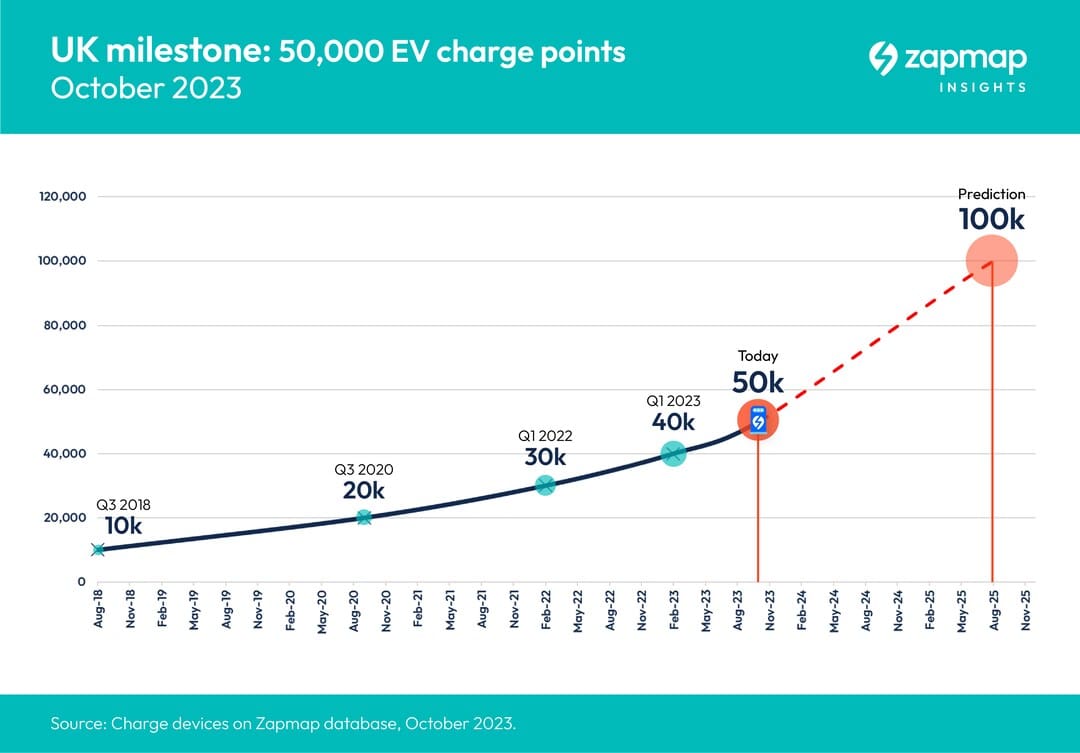Latest EV updates: EV innovation in 2023

From women innovating in EV technology to smart chargers, 2023 has been quite a year for the electric vehicle transition. With registrations of EVs up by 35% compared to this time last year, and the public charging network reaching a major milestone of 50,000 charge points a few months ago, there’s no better time to be an EV driver in the UK.
But it’s certainly not all been smooth sailing. Despite the successes of the industry, there have been several hiccups this year, not least the loss of Britishvolt, the postponement of the 2030 ban on the sale of new diesel and petrol cars, and intense political wrangling about London’s ULEZ expansion.
Interested in EV infrastructure? Read about the launch of Connected Kerb’s £1.9bn plan to install 190,000 on-street EV chargers by 2030 here.
We’ve dug into the latest EV updates in 2023, and what they mean for road transport decarbonisation…
The loss of Britishvolt and JLR’s gigafactory commitment
In the early days of 2023, Britishvolt, the UK battery manufacturing start-up, fell into administration. The company was planning the construction of a gigafactory to manufacture electric vehicle batteries, which the UK government hoped would secure battery supply chains for the nation’s automotive manufacturing industry while providing 3,000 skilled jobs in the northeast.
Despite the early disappointment, there was positive news later in the year. In July, Jaguar Land Rover (JLR) confirmed they would be investing £4bn into a new battery cell manufacturing site in Somerset. This means that the UK will now be home to two battery gigafactories as JLR’s site joins Nissan’s Envision plant in Sunderland, contributing towards the UK’s EV battery innovation and building on the nation’s historic automotive manufacturing base.
With BMW recently announcing an investment of £600m into its EV plant in Oxford, and Nissan pledging a further £2bn to build three EV models in Sunderland, the UK’s EV manufacturing industry certainly has a bright future ahead.
A boost to Local Authority charging budgets: LEVI Capital and Capability Funding
To supplement the Government’s ORCS funding for on-street charge points, the Department for Transport announced the Local Electric Vehicle Infrastructure (LEVI) Fund in June to support local authorities to roll out EV infrastructure. This £380mn fund is divided into the Capital Fund, allocating £343mn to the cost of installing charge points – with a focus on local on-street charging infrastructure – and the Capability Fund, which provides resources for local authorities to develop and deliver an electric vehicle charging strategy.
With the allocation process well underway, the LEVI Fund is set to give a real boost to the UK’s charging infrastructure, especially in areas which are lagging in the deployment of charge points, helping to increase equality of access to low-cost charging. Keep a close eye on this in 2024 – it could be a real game-changer to accelerate the rollout of EV charging infrastructure.
Connected Kerb pledged to install 10,000 EV chargers in Surrey
In the largest-ever rollout of public EV charging infrastructure by a local authority, electric vehicle charging company Connected Kerb announced plans to deploy 10,000 public EV chargers across Surrey by 2030. Given the UK government’s target of having 300,000 public EV charge points by 2030, this pledge is an important step towards meeting that goal and indicates the increased scale of local authority ambition.
This builds on the company’s ambitious plans to install 190,000 on-street EV charge points by 2030, which was launched by Greenhouse Communications and widely covered by the media.
If your company is focused on creating impact for people and planet, please get in touch with us to discuss working together.
Cornish Lithium production is on the horizon
China is well-known to be dominant in the EV battery supply chain, controlling the sourcing of many critical minerals essential for EV production. As geopolitical tensions rise between China and the West, export controls are being introduced, such as the recently announced controls on essential EV battery components like graphite. Thus, domestic alternatives to these critical minerals must be sourced. In August, Cornish Lithium announced an investment of £53.6mn to open the first-ever Lithium mine in Britain, in an important step to strengthen the nation’s position and secure a sustainable supply of this crucial component in EV batteries.
ULEZ expansion controversy
Over the summer, London’s ultra-low emission zone (ULEZ) was at the centre of a political whirlwind due to the controversial planned expansion of the zone in late August, which meant that drivers on the capital’s outer roads would be charged for the first time. The expansion prompted an 88% surge in UK electric vehicle registrations in July, and reports from November have shown that 95% of vehicles in the zone are now compliant with clean air standards. Despite measures to soften the impact on less well-off Londoners, such as the £160m scrappage scheme, London Mayor Sadiq Khan came under intense pressure to reverse the planned expansion due to the ongoing cost of living crisis, and even faced legal challenges over the scheme. Khan remained steadfast in his commitment to the ULEZ expansion, ultimately leading to a significant uptick in EV sales nationwide and improved air quality in London.
The Green Finance Institute published a report on second-hand EVs
The landmark report, published in June by the Green Finance Institute, predicted that the UK’s EV transition could be fast-tracked by over a decade if steps are taken to improve consumer confidence in used EVs. The report highlighted the perceived barriers preventing faster uptake of used EVs, including battery health, affordability, and charging infrastructure, signposting the need for strengthened government policy and support for the secondhand market in the transition away from ICE vehicles.
The Green Finance Institute worked with Greenhouse Communications to launch the report with maximum impact across the media and digital channels.

The postponement of the 2030 ban on the sale of new diesel and petrol cars and the confirmation of the ZEV mandate
In September, Prime Minister Rishi Sunak announced the postponement of the 2030 ban on the sale of new diesel and petrol cars. This move prompted dismay from many climate groups and some automakers, including Ford, who had invested £430mn in manufacturing facilities to meet the 2030 deadline. Despite the postponement of the ban, the zero-emission vehicle (ZEV) mandate was confirmed to come into force in 2024, requiring 22% of all cars produced by UK manufacturers to be pure electric or to face a £15,000 fine per car per day. This will rise to 80% in 2030, indicating that the pushback of the ban won’t necessarily change forecasts for EV uptake – but likely has damaged consumer confidence in EVs.
Critics have complained that mixed signals from the government will slow business investment and undermine the UK’s target to reach net zero by 2050, at a time when the nation is in danger of missing its medium-term carbon emission targets.
Major milestone: The 50,000th public EV charge point was installed
At a service station in Weston-super-mare, the 50,000th public EV charger in the UK was installed. The 40,000th public charge point milestone was only reached in February 2023, meaning a 25% increase in the number of charge points from February to October alone. In fact, ZapMap has predicted that the UK could reach 100,000 public charge points by as early as August 2025.
While the number of charge points alone is not the be-all-end-all to encourage drivers to make the switch, the apparent lack of charge points is still cited as a top barrier for many. These figures are an important indicator of increased ease of access to charging, especially for those without access to home charging.

New laws to make EV charging easier
The UK government approved new laws in October which will make it easier for EV drivers to charge up publicly, requiring charge point operators to increase transparency and comparability of prices across networks, use contactless payment options and open up their data. These new laws have been welcomed by many, as a common complaint drivers have when switching to EVs is the complexity of using public charging infrastructure. The new laws will take up to two years to be fully implemented, but when they are, they’ll make it a lot easier to charge an EV publicly.
From supply chains to charge points, it’s been a significant year for EVs in the UK. With LEVI funding set to further accelerate the rollout of public chargers, new gigafactories landing, and more fleets than ever transitioning to EVs, 2024 is set to be equally as game-changing.
Want more on sustainable transport? Read about 5 game-changing women driving the EV revolution.
Sign up to Greenhouse Morning News for the latest news on electric cars in the UK.


